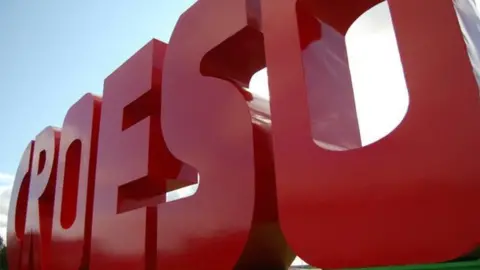Record-breaking Cardiff Eisteddfod makes £290k loss
 BBC
BBCEisteddfod bosses have hailed this year's "experimental" urban festival a success, despite a £290,000 deficit.
"It is not a loss because of a failure but a loss because of a success," said Ashok Ahir of the executive committee.
A record 500,000 people visited the event - treble the numbers in 2017 - causing unprecedented security costs.
Eisteddfod council members, who met in Aberystwyth on Saturday, said a larger taxpayer contribution may be needed if the 'open' event was held again.
The 2018 event cost about £4m to stage.
"The longer-term effect is the fact we have changed attitudes, not just towards the Eisteddfod but also the Welsh language in the capital city," said Mr Ahir.
"This is how you introduce Welsh to an unfamiliar audience; this is how you change attitudes towards the language - and this is how you encourage people to learn and use the language in all aspects of their lives."
 Sioned Birchall
Sioned BirchallAbout 6,000 competitors take part in the Eisteddfod and it is considered the largest music and poetry festival in Europe.
The 2018 free event in Cardiff Bay was open and centred around the Wales Millennium Centre - but made a £290,139 deficit, which will be funded by the Eisteddfod's reserves.
Bosses said traditional "fenced" Eisteddfods, which are centred around a Maes and attract about 150,000 visitors, had "a financial model that just about works" and "normally breaks even".

Caernarfon had considered hosting an urban Eisteddfod, similar to the one in Cardiff Bay this year, in 2021.
The Welsh Government makes a significant financial contribution to the Eisteddfod but greater public funds may be needed to finance another free event.
"If you were doing this kind of Eisteddfod again, you have to accept the funding model would have to be different because the nature of the event is different," added Mr Ahir.
"It becomes an open tourism event which it is not normally funded for, so those extra elements would have to be funded probably from the public purse."
